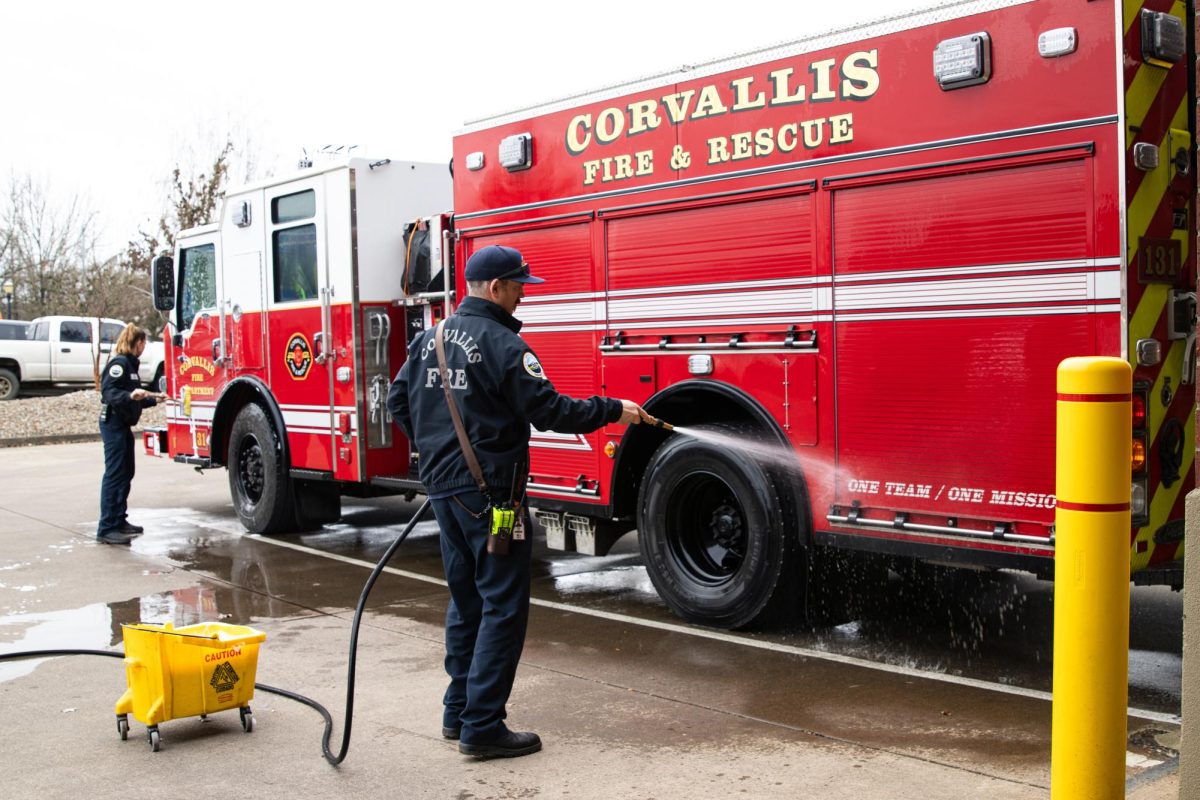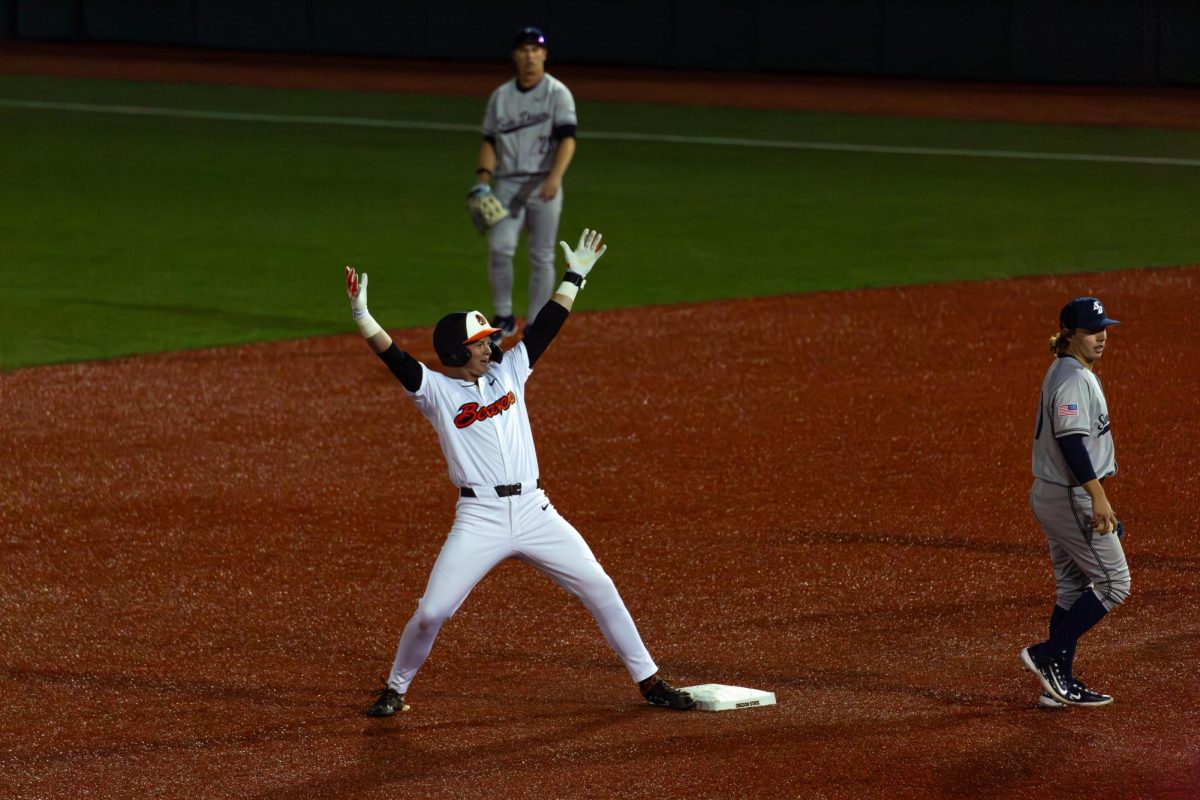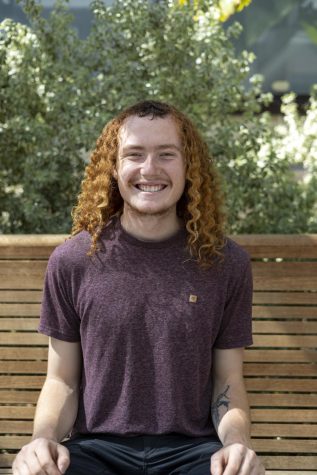Corvallis businesses evolve to persist through COVID-19, available funding
A sign to wear masks outside of a barber shop in downtown Corvallis, Ore. on Feb. 14. Small businesses are trying to constantly adapt to alterations in COVID-19 restrictions.
March 7, 2022
The outlook for Corvallis, Ore. small businesses continues to change with alterations in COVID-19 restrictions, weather and available funding.
The COVID-19 pandemic has passed the two-year mark. At the time of publication, over 5.98 million people have died worldwide due to COVID-19. However, with mask mandates lifting around the United States and case rates declining, to some people, it seems the end is in sight.
Coupled with the warmer months approaching, Corvallis businesses are hoping for a return to normal. While there has been relief for some businesses, others have continued to struggle, according to William McCanless, the owner of Interzone Cafe.
“I really think I’ll make it just fine, I just gotta make sure I don’t bankrupt myself before things get back to normal,” McCanless said. “Two out of three restaurants in this town did not get that Restaurant Revitalization Fund… They underfunded it and they overgave—they were going to offer me four times the amount that I needed… The funds just went dry.”
The RRF was established through the American Rescue Plan Act to help restaurants and other eligible businesses stay open by providing “funding equal to their pandemic-related revenue.”
McCanless said he is living on loans rather than grants right now.
“I’ll be fine, I can dig deep, I can borrow again, but I don’t want to,” McCanless said. “I’ve been doing this long enough that I don’t think I’m going out of business, but going out of business is all relative. I have a stake into this even more than most businesses in that I’m halfway through buying this building… I have enough ego that I don’t want to go under.”
According to McCanless, Interzone is down 5-10% in revenue from the last Oregon State University school quarter, and that quarter, fall term, was down 25% from pre-COVID-19.
“I’m operating within my budget,” McCanless said. “In the past, my mornings paid for my nights. But if my mornings are barely paying for the days, like right now… I keep thinking that the finish line is here.”
Some businesses were able to adapt to COVID-19 restrictions in different ways, with the ability to move services online.
“I had moved to all lessons using Zoom when this hit, when we were doing lockdown,” said Daniel L. Lowery, owner and chief instructor of Corvallis Martial Arts. “I held onto as many folks as I could up until some people dropped off. A lot more of the children, as opposed to adults, and a lot more people that just got started, as opposed to people that were already invested and several belts in. After the lockdown, where they allowed in person but distanced out [interactions], I was having small classes in person, and once the weather broke last summer, we moved outside. As any variant would hit or miss, it has always been distancing, masks on—all of the above.”
According to Lowery, he qualified for a disaster loan for damages caused by the COVID-19 pandemic. He took out the amount that was forgivable, rather than the whole amount, to stay debt-free. Lowery said he was fortunate enough to not have needed to take out any other loans.
Last month, the Oregon House Democrats passed House Bill 4015, which will expand the state’s Entrepreneurial Development Loan Fund. This could raise the amount of money that small businesses with 25 employees or less can receive in grants from $100,000 to $1 million per year if fully passed.
The biggest help throughout the pandemic, according to Lowery, has been his students. Students would pay several months ahead of time, and because he was one of the few businesses operating in-person, he was able to get a fair amount of business, rather than businesses like restaurants that were more restricted on space.
“A lot of people ask a lot of different things like, how did you survive?” Lowery said. “I think that is an attitude of wanting to succeed and not giving up… I have never ever let politics enter my business, religion and sports as well… I adopted that attitude with this pandemic. I knew how people felt, but I always tried to keep this location as a neutral location, to focus on martial arts.”


















































































![Newspaper clipping from February 25, 1970 in the Daily Barometer showing an article written by Bob Allen, past Barometer Editor. This article was written to spotlight both the student body’s lack of participation with student government at the time in conjunction with their class representatives response. [It’s important to note ASOSU was not structured identically to today’s standards, likely having a president on behalf of each class work together as one entity as opposed to one president representing all classes.]](https://dailybaro.orangemedianetwork.com/wp-content/uploads/2025/03/Screenshot-2025-03-12-1.00.42-PM-e1741811160853.png)
























